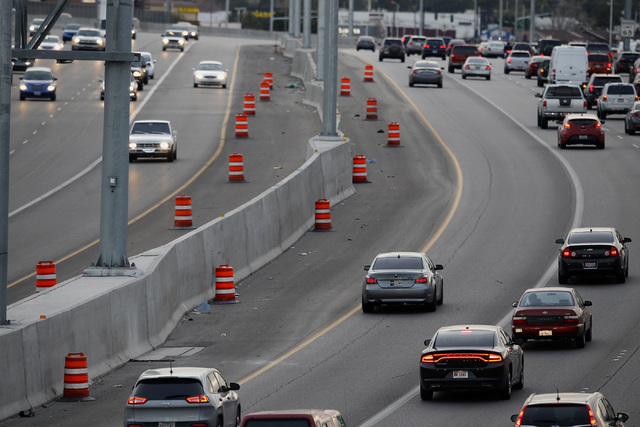BLOG: Getting a ticket for driving the legal speed limit? The hell you say!
Author’s note: This blog has been altered from its original version to correct an error.
CARSON CITY — How can somebody who is following the law be cited for breaking the law?
That tantalizing question arose Tuesday in the Assembly Transportation Committee, as lawmakers reviewed Assembly Bill 334, a measure that would prohibit driving in the left-hand lane of a highway if the driver knows, or reasonably should know, that a faster vehicle is trying to pass.
We’ve all seen it, of course. Drivers who are going slower than everybody else, just hanging out in the fast lane, oblivious or intentionally obtuse to others on the road. We’ve all wished a highway patrol trooper would come along and give them a ticket.
But what if that slow driver is going the speed limit? (In Las Vegas, that’s typically 65 mph.) What if everybody else on the road is breaking the law by driving faster than the speed limit, leaving the law-abiding slow driver looking like the odd person out? Is it fair or even right to give that person a ticket? Or, as Assemblyman Michael Sprinkle, D-Sparks, put it: How can a driver obeying the law be impeding traffic?
(Lay aside, for a moment, the fact that Nevada law currently says cars should avoid driving in the left-hand lane on highways with two or more lanes except to pass slower drivers. This is a more philosophical question.)
What’s really being asked is this: Do the rules of the road — which clearly say slower vehicles should yield to faster ones, regardless of the speed limit — trump the laws of the Nevada Revised Statutes? And can adhering slavishly to the speed limits posted at roadside ever be wrong?
In a word, I think, the answer is yes.
Traffic flow works most efficiently (not to mention safely) when vehicles are going roughly the same speed, and traveling in the appropriate lane. A car preparing to exit a freeway, or one just coming on, may be going slower than the rest of traffic. That’s why there’s typically slowing in the right-hand lane as new cars join the flow and get up to freeway speeds.
But things go off the rails when one vehicle is going much faster, or much slower, than everybody else. Drivers must brake or swerve as a faster driver weaves in and out of different lanes, looking for an advantage. Drivers change lanes and move around slower drivers, thus increasing the potential for accidents.
This happens regardless of the speed limit, by the way. If the speed of traffic is 45 mph, the guy going 30 will cause a disruption just as surely as the guy trying to go 55. I typically drive (on a wide-open freeway) at about 80 mph, if conditions permit. But I also practice what I preach, and if approached by a driver going faster than me, I will yield the lane to allow the faster drive to pass, no matter how fast I’m driving or what the speed limit is.
My reasoning: While I could stand on principle, not to mention the NRS, the laws of nature will remain unchanged. If we all drove so as to allow the fastest traffic to run on the left, and slower traffic on the right, we’d all be better off and safer, no matter the speed limit.
Yes, I understand that speeding is illegal and potentially dangerous, and that crashes at higher speeds are more likely to result in more severe injuries than crashes at slower speeds. But that knowledge — which I assume is shared by many of my fellow drivers — does not seem to change road behavior.
Perhaps it’s an absurd result, to conclude that a driver going a legal speed could get a ticket (not to mention a fine that starts at $50 and goes up, depending on the number of violations in a seven-year period). But it’s equally absurd, I think, to assume that just because you’re driving the speed limit, no one on the road should or will want to drive faster. We see that reality every day on the freeways.
AB 334 deserves some more debate, at the very least.
Steve Sebelius is a Review-Journal political columnist. Follow him on Twitter (@SteveSebelius) or reach him at 702-387-5276 or SSebelius@reviewjournal.com.






















